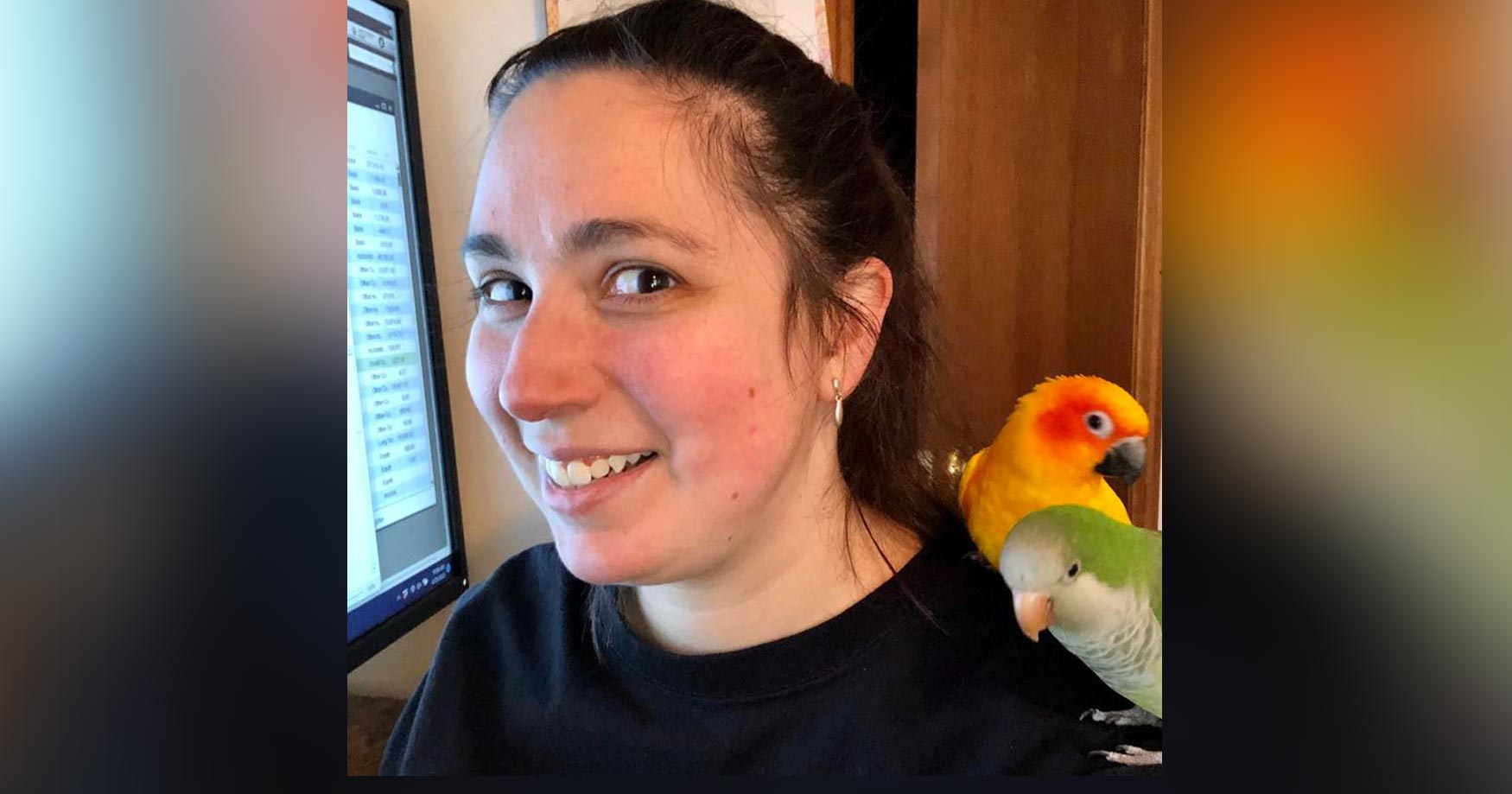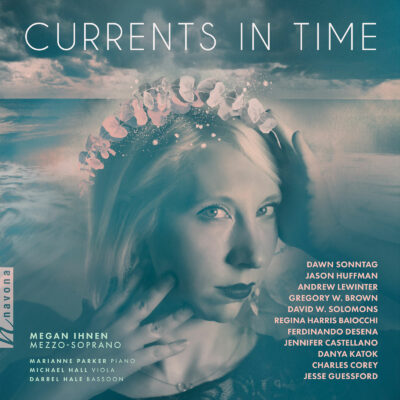CURRENTS IN TIME showcases the profundity of the human voice in a prime selection of a cappella and subtly orchestrated compositions, whose lyrical foundations are as diverse as the emotional states transported: from grief to joy, modesty to hubris, and self-doubt to unshakable faith and valor. Featured on the album is composer Jennifer Castellano‘s Mine to Keep, a piece based on a text by Hellen Keller, whose faith and optimism the composer has always admired.
Today, Jennifer is our featured artist in “The Inside Story,” a blog series exploring the inner workings and personalities of our composers and performers. Read on to explore her fascinating and complex journey becoming a professional musician, creating music with both hearing and vision loss, and her inspirations growing up.
Who was your first favorite artist(s) growing up?
I grew up in the 1980s listening to Elton John, Billy Joel, Whitney Houston, Michael Jackson, Bon Jovi, and many others. However, my earliest influences were my mother and Jerry Lee Lewis, who both got me interested in learning piano. My mother studied piano for several years and played classical music and Italian songs in our home. I was introduced to Jerry Lee Lewis when I first heard his signature hit “Great Balls of Fire.”
When did you realize that you wanted to be an artist?
I was about 6 years old when I started to dream of becoming a performer. However, I didn’t take it seriously. It was more or less a fantasy. I didn’t receive a whole lot of encouragement from people either. Shortly after I began studying the piano at 8 years old, I learned that I had hearing loss in both ears and needed to wear hearing aids so that I could better hear and understand speech, especially in the classroom where I was having extreme difficulty. I can remember the audiologist asking me what I wanted to be when I grew up, and I blurted out, “a musician.” Bet she didn’t see that one coming!
It seemed at first to be a paradox because when I began my piano studies, I was first taught to play by ear before learning to read music. Because I was born with a visual impairment, reading printed music was very difficult for me in the beginning. I didn’t learn how to read music notation until two years into my piano studies.
As I grew older, I managed to convince myself that music was more or less a hobby and that it was not something I would continue to do. I got the old “what will you do with that?” or “you can’t support yourself as a musician.”
Nevertheless, I continued my piano studies and was an active member of the choir in my school. When I began my university studies, I had not declared a major area of study. I stumbled into the music department and auditioned and was accepted. I didn’t think I would stick with it. I thought I would be a mathematics major.
No matter how hard I tried to push music off to the side, I somehow got sucked back into it. It was like an incurable disease that was invading my life, a bad habit that I could not break. Many have said that it is easy to quit something rather than keep at it, but in this case, it was easier to keep at it rather than to quit.
I graduated college with a B.A. in Music, Piano Performance, and that’s when I began to take myself a little more seriously. I even went on to study at the masters level, earning my Master in Music with a concentration in Composition.
What was your most unusual performance, or the most embarrassing thing that happened to you during a performance?
During the second semester of my freshman year, my classmates and I were assigned a composition project in which we could write a piece in whichever way we chose. I had not begun writing music seriously at that time and had no clue what I was going to do. Several of my classmates were writing more serious works, such as violin sonatas, and trios, and then there was me who was completely lost. Unlike many of my classmates, I had no composition or music theory training prior to starting college.
I was rummaging through my recycle bin for ideas and stumbled across a couple of tin cans. I decided to write a rhythmic composition for four tin cans. I recruited three of my classmates, and we each had one tin can and would strike it with a pen. The piece was called Reduce, Reuse, Recycle. We performed it for the class, and it was received well by my professor. The next day, while walking through the music building, the receptionist congratulated my piece for being one of the pieces selected to be in the Composer’s Concert, which was coming up at the end of the week. I was utterly shocked and ran to the list posted on the bulletin board that listed all the names of the students whose pieces would be programmed. I was a bit embarrassed because my minute-long composition was among the more sophisticated works of my classmates. Nevertheless, the performance went well, and I received a few compliments. Another professor, from the Studio Art department, thought it was genius and said that it reminded him of the percussion performance group, Stomp.
What is your guilty pleasure?
I like watching videos on YouTube and probably could spend hours on there if time allowed me. I watch things from lectures and documentaries to funny parrot videos. Even my two small parrots enjoy YouTube and I found a great channel for them to watch called Parrot TV.
If you could make a living at any job in the world, what would that job be?
That’s a tough one to answer because I never thought about it that much. When I was a kid, I always wanted to be a radio personality. I used to pretend I had a talk radio show by using my tape recorder. It was pretty goofy, but I would conduct interviews by using two tape recorders. I always made funny commercials, too. The sole purpose of the show was to be informative yet provide comic relief. There was one section of my program where I would record common sounds. I loved capturing sounds because I had a tape player, which allowed me to change the speed and even play the sound in reverse. I guess it would be cool to do something like that, sharing ideas and providing comic relief with others over the airways. It would be cool if my two parrots could be my two sidekicks. It could be the Early Bird Show.
If you could spend creative time anywhere in the world, where would it be and why?
I am not quite sure, but my most favorite place that I have visited that I would love to return is Israel. I went on pilgrimage there in 2015 with members of my church. My group and I went on a boat ride on the Sea of Galilee where we sang and danced to traditional Israeli folk music. That would be a great place to return and get inspired.
If you could instantly have expertise performing one instrument, what instrument would that be?
I always have dreams about playing Celtic music on the violin, so I guess I would want to be an expert in violin in various genres of music.
What was your favorite musical moment on the album?
I enjoyed listening to the recording process and was amazed by how quickly everything came together. It was quite an amazing experience because the composition had not been played or performed in about 20 years. To hear it come to life again made me love the piece even more. It is as if the piece held more meaning for me today than it did 20 years ago.
What does this album mean to you personally?
It’s kind of a blast from the past. The composition that I wrote is about 20 years old. After I wrote it, I figured that was it and didn’t really think anything much would come out of it. It had only ever had one performance I didn’t think it would ever have a performance, much less a recording. Only the first movement had a performance because the other two movements had not existed yet.
Is there a specific feeling that you would like communicated to audiences in this work?
I was born with a very rare genetic disorder called Harboyan Syndrome, which affects the cornea of the eye and the cochlea of the ear. Having grown up with both hearing and vision loss, I was introduced to the life of Helen Keller. She is the author of the text of this piece, and her words clearly express both her positive outlook on life and her strong faith in God. I hope that this piece uplifts the soul of the listener who hears it, as it often uplifts mine after all these years.
Explore Jennifer’s Latest Release
CURRENTS IN TIME
CURRENTS IN TIME is available now from Navona Records. Click here to visit the catalog page and explore this album.
The views and opinions expressed in this post are those of the artist and do not necessarily represent or reflect the views and opinions held by PARMA Recordings LLC and its label imprints, subsidiaries, and affiliates.




